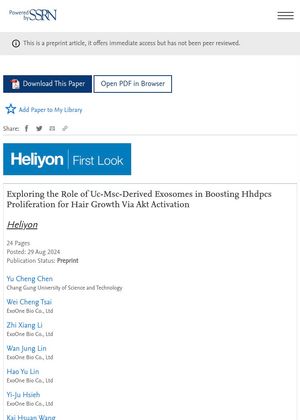Exploring the Role of UC-MSC-Derived Exosomes in Boosting HHDPCs Proliferation for Hair Growth via AKT Activation
January 2024

TLDR UC-MSC-derived exosomes may help treat hair loss by promoting hair cell growth through AKT activation.
This study investigates the impact of human umbilical cord mesenchymal stem cell-derived exosomes (UC-MSC-Es) on the proliferation of human hair dermal papilla cells (HHDPCs), which are crucial for hair growth. The exosomes, sized between 30 to 180 nm and expressing markers like CD9, CD63, CD81, CD73, TSG101, and Alix, significantly increased HHDPC populations in the S and G2/M phases of the cell cycle. They also elevated the expression of cell cycle-related proteins β-catenin and cyclin D1. Mechanistic studies revealed that UC-MSC-Es promote the phosphorylation of AKT and GSK-3β, and inhibiting AKT reduced their proliferative effects. These findings suggest that UC-MSC-Es could potentially treat hair loss by modulating AKT-dependent pathways in HHDPCs.


